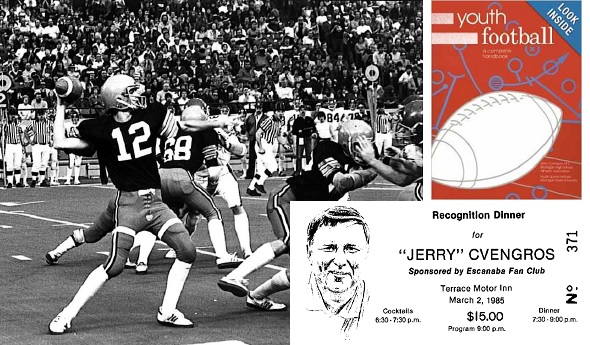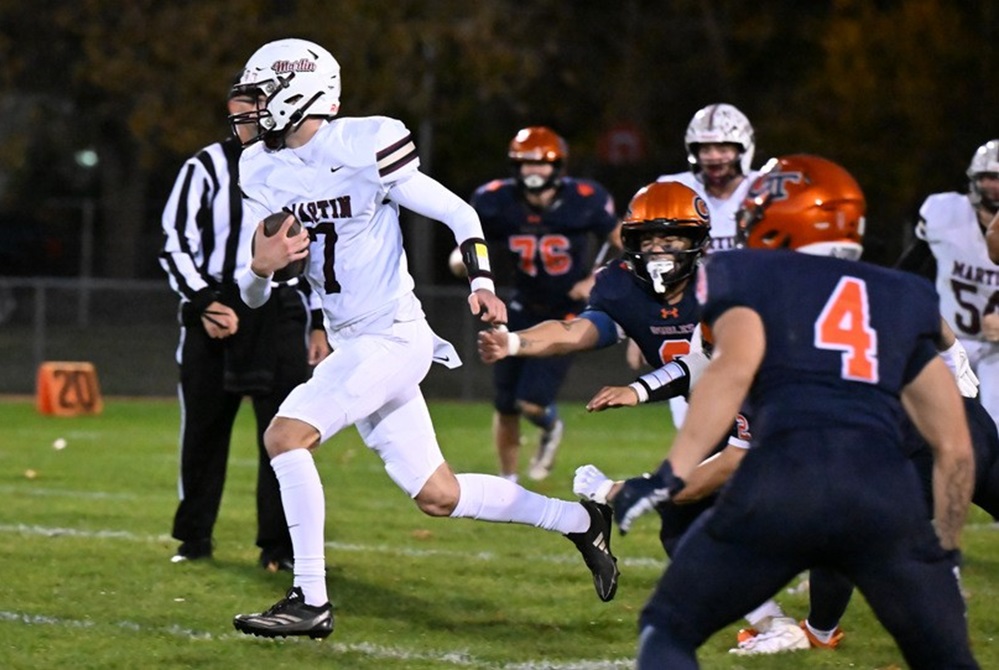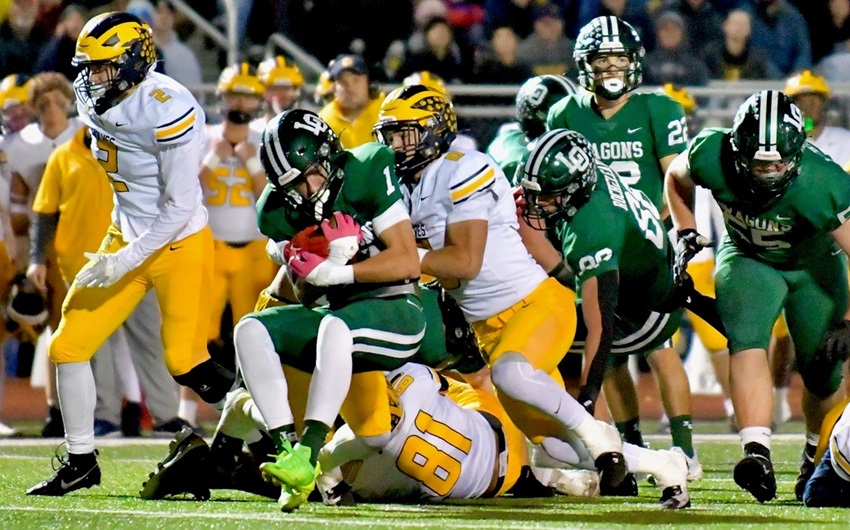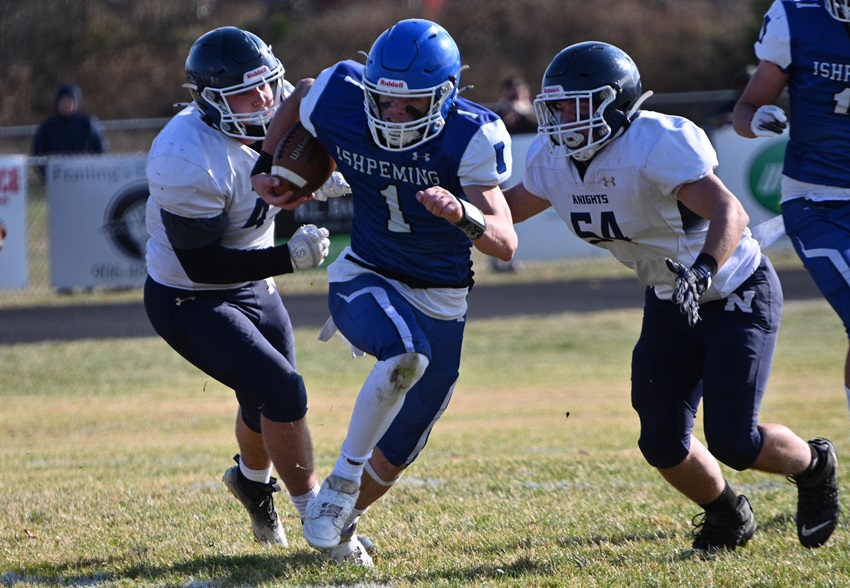
Cvengros Leaves Lasting Impact
By
Geoff Kimmerly
MHSAA.com senior editor
April 1, 2014
Retired Associate Director Jerry Cvengros, who served at the Michigan High School Athletic Association for more than 13 years after three decades at Escanaba High School, died Monday evening in Lansing. He was 80.
As lead assistant to Executive Director John E. “Jack” Roberts from August 1988 until retiring in January 2002, Cvengros served as director of football and briefly hockey in addition to coordinating the Program of Athletic Coaches Education (PACE), presenting annual in-service training for administrators and serving as MHSAA liaison to statewide principals, athletic directors and coaches associations.
 He came to the MHSAA after 30 years at Escanaba, where he taught, coached, served as athletic director and later principal during a tenure stretching from August 1958 through July 1988. While at Escanaba, Cvengros also represented Upper Peninsula Class A and B schools on the MHSAA Representative Council from 1983-88 and served as the Council’s president from 1986-88.
He came to the MHSAA after 30 years at Escanaba, where he taught, coached, served as athletic director and later principal during a tenure stretching from August 1958 through July 1988. While at Escanaba, Cvengros also represented Upper Peninsula Class A and B schools on the MHSAA Representative Council from 1983-88 and served as the Council’s president from 1986-88.
Cvengros received the MHSAA’s Charles E. Forsythe Award in 2000 in recognition of his many and significant contributions to interscholastic athletics.
“During his lifetime, Jerry Cvengros impacted every area of interscholastic athletics as a coach, athletic director, principal and then associate director of the MHSAA," Roberts said. “He was the perfect combination of fairness, toughness and diplomacy, able to draw on a vast knowledge of MHSAA rules and an understanding of educational athletics fostered by his various experiences.
“Jerry was known and respected statewide for his dedication, and his contributions have had a lasting impact.”
Cvengros built an elite football program at Escanaba as varsity head coach from 1962-84, leading the Eskymos to a 161-42-3 record, a Class A runner-up finish in 1979 and the MHSAA championship in 1981. That team remains the only Class A/Division 1 team from the Upper Peninsula to win an MHSAA football title. Cvengros was inducted into the Michigan High School Football Coaches Association Hall of Fame and served on its original Board of Directors.
His 1979 team fell to Detroit Catholic Central 32-7, but he brought the Eskymos back to the Finals for a 16-6 win over Fraser two seasons later. Cvengros' championship lineup included quarterback Kevin Tapani, who would go on to pitch for the Minnesota Twins among five major league clubs, and tailback Dean Altobelli, who later played at Michigan State University. The title run included a 15-14 Semifinal win over Dearborn Fordson that included a savvy two-point conversion call by Cvengros, who wanted to avoid overtime after a late score drew Escanaba to within a point of tying the score.
As the MHSAA’s director of football, Cvengros was instrumental in creating the current playoff format that expanded the field from 128 to 256 teams beginning with the 1999 season. He also co-authored “Youth Football: A Complete Handbook,” a guide to coaching at that level.
Among many additional honors, Cvengros was inducted into the Upper Peninsula Sports Hall of Fame and Michigan High School Coaches Association Hall of Fame and received the Distinguished Service Award from the Michigan Interscholastic Athletic Administrators Association. The National Federation of State High School Associations twice awarded Cvengros with a Citation – the NFHS’ highest honor – for his service as a coach and then as a member of the MHSAA staff.
Since his retirement, Cvengros and his wife Shelley have continued to reside in Okemos. A visitation will take place beginning at 10 a.m. Monday, April 7, at St. Martha Parish in Okemos, with a funeral Mass to follow at 11 a.m.
Cvengros was a 1951 graduate of Ironwood High School and went on to study and play football at the University of Wisconsin in Madison. He earned his bachelor’s degree in secondary education and teaching from the University of Wisconsin-Superior and a master’s from Northern Michigan University.
He taught English, history and physical education at Escanaba High School and also coached basketball and track and field. He became the school’s athletic director in 1970, added the duties of activities director in 1975 and became principal in 1983.
Cvengros is survived by his wife and children Michael, Steven and David, and seven grandchildren. He was preceded in death by his daughter Lee Ann (Cvengros) Swasey in May 2013.
PHOTOS: (Clockwise from left) Escanaba quarterback Mike Beveridge fires a pass during the 1979 Class A Final; Cvengros co-authored a book on coaching youth football; Cvengros was celebrated once more in Escanaba following his final season as football coach.

1st & Goal: 2024 Playoffs Week 1 Review
By
Geoff Kimmerly
MHSAA.com senior editor
November 4, 2024
The ability to play another day obviously is the best reward for 288 teams that qualify for the MHSAA Football Playoffs.
 But another of the greatest gifts is the chance to make up for a missed opportunity from the regular season.
But another of the greatest gifts is the chance to make up for a missed opportunity from the regular season.
We highlight below 40 of our 144 first-round games from this past weekend. Of those 40, 15 were rematches – and of those rematches, nine were won the second time by the team that lost the first.
11-Player Division 1
HEADLINER Grandville 24, Rockford 14 For the second-straight season, Grandville (6-4) opened the playoffs with a win – and this time with its first over the Rams since 2019. Rockford (7-3) had defeated Grandville 37-20 in Week 3, but with Tank Terry scoring twice during the third quarter the Bulldogs brought a lead into the second half of this rematch and never trailed again. Click for more from the Grand Rapids Press.
🏈 GRANDVILLE WITH THE UPSET OVER ROCKFORD🔥
Check out the highlights of Grandville beating Rockford 24-14 in the Division 1 @MHSAA Football District Semifinal on November 1st, 2024@GrandvilleFB
🎥 WXMI-TV pic.twitter.com/v9dcweL43k
— STATE CHAMPS! Michigan (@statechampsmich) November 2, 2024
District Digest Hudsonville 25, East Kentwood 23 On the other side for Grandville in their District bracket, Ottawa-Kent Conference Red champion Hudsonville (9-1) held off a strong challenge from the Falcons (5-5) after having defeated them 35-6 in their Week 5 meeting. Oxford 21, Davison 14 Oxford (7-3) went on the road, and coming off a Week 9 loss, to win its first playoff game since 2021 and guarantee its best record since 2018 – when the Wildcats also opened the playoffs with a win over Davison (7-3). Clarkston 34, Lake Orion 16 The Wolves (7-3) are surging with five wins over their last six gams and this avenging their only loss during that string, a 20-13 defeat to the Dragons (6-4) in Week 7.
11-Player Division 2
HEADLINER Byron Center 38, Grand Rapids Northview 17 Byron Center (9-1) just missed on a league championship this fall but will play for a second-straight District title after pulling away to hand O-K Black champion Northview (9-1) its only loss this fall. The Bulldogs earned a rematch this week with O-K Green rival Muskegon Mona Shores, which won their Week 4 meeting 14-12. Northview closed its first winning season since 2019 with more victories than the last two combined. Click for more from FOX 17.
Byron Center with a 38-17 win over Northview in the Division 2 District Semifinal on November 1st, 2024. Powered by @Reactiontech @BCCoachCisco | @gobcbulldogs pic.twitter.com/UvbmwLHmQp
— STATE CHAMPS! Michigan (@statechampsmich) November 3, 2024
District Digest Grosse Pointe South 27, Roseville 26 South (10-0) at one point led 24-6 and held on to reach double-digit wins for the first time – and after going 9-2 a year ago and losing to Roseville (7-3) in a District Final, 24-17. Mattawan 27, Lansing Everett 21 Mattawan (7-3) is enjoying its winningest season since 2017, with this its first playoff victory since 2012. Everett (6-4) improved a win from a year ago to tie its highest total since 2014. Farmington 39, White Lake Lakeland 13 Farmington (7-3) earned its first playoff win since 2019 – continuing a rebound from 2-7 a year ago – and defeated a Lakeland team (6-4) that made the playoffs for the seventh time over the last eight seasons.
11-Player Division 3
HEADLINER Linden 42, Fenton 14 Linden (5-5) opened this season 0-2 and finished the regular season with two defeats and three over its last four games. But all of that may have paid off with this win to avenge a 24-21 Week 6 loss to the Tigers (7-3) that ended up deciding the Flint Metro League Stripes championship. That loss to Fenton was one of four three-point heartbreakers the Eagles endured this fall, but they will play for a District title this week. Click for more from the Tri-County Times.
District Digest Riverview 22, Trenton 21 Riverview quarterback Lucas Thompson put his team ahead to stay with a 2-point conversion run with 20 seconds to play, giving the Pirates (9-1) a close playoff win over Trenton for the second-straight season after they defeated the Trojans (6-4) by two in a District opener a year ago. Grand Rapids Forest Hills Central 7, East Grand Rapids 0 The reigning Division 3 champion Rangers (8-2) followed up a 24-0 win over EGR in Week 9 by just getting past the Pioneers (5-5) again. Walled Lake Western 49, Garden City 7 The Warriors (10-0) are expected to be top contenders in this division and reached 10 wins for the second straight season, but Garden City (7-3) deserves recognition as well for completing its winningest campaign since 2000.
11-Player Division 4
HEADLINER Dearborn Divine Child 42, Madison Heights Lamphere 6 Lamphere (8-2) entered the postseason No. 3 in the coaches poll and completed its third eight-win season over the last five. But Divine Child will play on after freshman quarterback Drew Sheridan threw five touchdown passes to send the Falcons (7-3) into a District Final matchup with reigning Division 4 champion Harper Woods. Click for more from the Dearborn Press & Guide.
Dearborn Divine Child starts the 2024 Division 4 Football Playoffs with a BIG 42-6 win over Lamphere in the District Semifinal on November 1st, 2024. Freshman quarterback Drew Sheridan threw 5 touchdown passes in the victory. Powered by @altaequipment @DCHS_Football14 |… pic.twitter.com/iZABbYwEse
— STATE CHAMPS! Michigan (@statechampsmich) November 2, 2024
District Digest Edwardsburg 29, Battle Creek Harper Creek 8 Edwardsburg (7-3) has shown plenty of times over the last 15 years why it is a scary playoff opponent, and this became another example as Harper Creek (8-2) entered the weekend coming off a league title and finished with its best record since 2017. Niles 42, Paw Paw 14 The two teams that finished ahead of Edwardsburg in the Wolverine Conference met for the second week in a row, with Niles (9-1) adding to its 21-0 win from Week 9 to end Paw Paw’s season at 8-2. Harper Woods 46, Redford Union 6 Harper Woods (7-3) entered the playoffs ranked No. 5 by the coaches, and Redford Union (8-2) was No. 2 and also had lost to the Pioneers in their season opener 43-21.
11-Player Division 5
HEADLINER Gladwin 18, Kingsford 15 When a team moves to 7-3 with all three of its losses to league champions, it’s difficult to call it a stunner. But Gladwin can claim it as Kingsford (9-1) also was a league champion, undefeated and ranked No. 3 entering this District Semifinal. Eric Roggow’s fourth-quarter field goal was the decider for the Flying Gs. Click for more from the Bay City Times.
District Digest Ogemaw Heights 21, Clare 13 Just as the Week 5 matchup went to Ogemaw Heights, 41-34, so too did the rematch between the Jack Pine Conference Division 1 co-champions. Clare finished 7-3 for the second-straight year after completing its 19th-straight winning regular season. Romulus 26, Detroit Lincoln-King 24 Romulus (5-5) earned its first playoff win since 2016, and in doing so handed Lincoln-King (9-1) its only loss of what was by far the most successful season of its three-year varsity history. Lincoln-King was 0-9 two seasons ago and 3-6 last fall. Flat Rock 40, Detroit Denby 22 Flat Rock (8-2) advanced by defeating a league title winner in Detroit Public School League Gold co-champion Denby (6-4), putting the Rams in position to play for a third-straight District trophy.
11-Player Division 6
HEADLINER Ovid-Elsie 44, Almont 21 The Mid-Michigan Activities Conference saw its undefeated champion fall (see below) but its runner-up down another undefeated league title winner as Ovid-Elsie handed No. 2 Almont its only loss. This was a rematch of a 2023 Semifinal won by the Raiders 45-21, but this time the Marauders put up their most points since mid-September and the most Blue Water Area Conference champ Almont (9-1) had given up in a game since 2021. Click for more from Lansing State Journal.
District Digest Lansing Catholic 36, Chesaning 29 The Cougars (7-3) have won at least one playoff game now eight seasons in a row, and this one came against MMAC champion Chesaning (9-1) and a defense that otherwise gave up just 12 points per game this fall. Detroit Central 34, Detroit Edison 16 Central (7-3) shared the PSL Gold title with Denby and then won the PSL Gold City championship, and this victory over No. 9 Edison (6-4) ranks right up there as well. Constantine 39, Parchment 14 Just because Constantine (7-3) found itself outside a league title race this fall for the first time in a while doesn’t mean the Falcons were going to go quietly – and they made some serious noise in avenging a 51-30 loss to Parchment (7-3) from Week 7.

11-Player Division 7
HEADLINER Union City 42, Hanover-Horton 13 Big 8 Conference champ Union City (9-1) has scored nearly 36 points per game during its winningest season since 2011, and this was the Chargers’ fourth time reaching 42 as they bounced back from a Week 9 loss to Buchanan. Hanover-Horton (8-2) closed this season with two losses to teams a combined 18-2 but must be celebrated for its best showing since 2014, a run which included a Cascades Conference West title. Click for more from the Coldwater Daily Reporter.
District Digest Clinton 38, Ottawa Lake Whiteford 32 The former Tri-County Conference rivals met for the first time since 2019, Clinton’s last season in the TCC, and this time the Redwolves (7-3) came back from two straight losses to end the regular season to end Whiteford’s fall at 5-5. Traverse City St. Francis 41, Charlevoix 16 The Gladiators (7-3) won this matchup of Northern Michigan Football League divisional champions, having also defeated the Rayders (6-4) in the season opener 67-22. McBain 49, Harrison 6 McBain (9-1) bounced back from a Week 9 loss to reach a second-straight District Final. Harrison (7-3) finished this fall with three straight defeats to playoff teams but with its best record since 2015 and after going 2-7 both of the last two seasons.
11-Player Division 8
HEADLINER Saginaw Michigan Lutheran Seminary 21, Saginaw Nouvel Catholic Central 20 These neighbors have played one-point games three of the last five seasons, and Nouvel (8-2) actually won their regular-season meeting in Week 4, 23-14, and led this time 6-0 into the third quarter. But MLS (7-3) found its stride thereafter to earn its second trip to the District Finals in three seasons. Click for more from the Saginaw News.
District Digest Saugatuck 24, White Pigeon 22 After having three of its last four seasons ended by White Pigeon (8-2) in the playoffs, Saugatuck advanced to a second-straight District Final by winning the closest game for both this fall. Beal City 47, Frankfort 0 Beal City (8-2) faced Frankfort (7-3) in a playoff opener for the second-straight season, adding this win to last year’s 42-7 victory that started a Semifinal run. Harbor Beach 35, Ubly 0 The Pirates (10-0) posted their second-straight shutout and fifth of the season in ending this year’s run and a six-game winning streak for last fall’s Division 8 champion Bearcats (6-4).

8-Player Division 1
HEADLINER Martin 52, Gobles 22 The two-time reigning champion Clippers appear to be in playoff form again, as this avenged a 20-14 loss to Gobles from just three weeks earlier. This made it two seasons in a row that Martin (9-1) avenged a regular-season loss to the Tigers (9-1). The Clippers broke away with 30 second-half points to Gobles’ eight. Click for more from the Kalamazoo Gazette.
Regional Roundup Mendon 58, Climax-Scotts 50 Mendon’s Owen Gorham ran for 231 yards and five touchdowns, the last a four-yarder with three seconds to play followed by his 2-point conversion to push the Hornets (9-1) past Climax-Scotts just two weeks after losing to the Panthers (8-2) 46-44. Kingston 16, Fulton 14 The Cardinals (8-2) earned a rematch with rival Deckerville by handing the Pirates (8-2) just their second loss of their winningest season since 2010 in 11-player. Ishpeming 44, Norway 38 The Hematites’ first run into an 8-player bracket is off to the right start, with this win over the Knights (7-3) earning Ishpeming (6-2) a rematch with Week 4 opponent Pickford.
8-Player Division 2
HEADLINER Onekama 22, Marion 20 Both finalists for last season’s Division 2 championship were eliminated from this year’s bracket, and we’ll start with the reigning runner-up Marion (8-2) – which had defeated Onekama 44-8 in Week 2. The Eagles ended their season with two losses by a combined six points. But the Portagers improved to 9-1, one more win than their last four seasons’ totals combined. Click for more from the Manistee News Advocate.
Regional Roundup Mount Pleasant Sacred Heart 24, Grand Rapids Sacred Heart 21 After debuting in varsity play last season with a win by forfeit and two losses, Grand Rapids Sacred Heart (9-1) established itself with a perfect regular season and No. 1 ranking heading into this playoffs. But Mount Pleasant Sacred Heart (7-3) had seen plenty of top competition with its three losses to teams that all finished the regular season 8-1. Morrice 28, Portland St. Patrick 22 Two of those one-loss teams that had defeated MP Sacred Heart met on the other side of the bracket, with Morrice (9-1) avenging a 29-12 Week 4 defeat to the Shamrocks (8-2). Britton Deerfield 58, Adrian Lenawee Christian 15 The Patriots (9-1) reached nine wins for the second time in four seasons – and after finishing just 2-7 a year ago – completing a 2024 sweep of the 2023 Division 2 champion Cougars (4-6).
MHSAA.com's weekly “1st & Goal” previews and reviews are powered by MI Student Aid, a division within the Department of Lifelong Education, Advancement, and Potential (MiLEAP). MI Student Aid encourages students to pursue postsecondary education by providing access to student financial resources and information. MI Student Aid administers the state’s scholarship and grant programs that help make college Accessible, Affordable and Attainable for you. Click to connect with MI Student Aid and find more information on Facebook and Twitter @mistudentaid.
PHOTOS (Top) Martin’s Gavin Meyers (7) breaks through a gap in the Gobles defense Friday. (Middle) Clarkston’s Griffin Boman (0) wraps up Lake Orion’s Jayden Borrero. (Below) Ishpeming's Caden Luoma breaks away from Norway's Carter Cazzola (43) and Keith Burar, Jr. (54). (Top photo by Gary Shook. Clarkston/Lake Orion photo by Terry Lyons. Ishpeming/Norway photo by Cara Kamps.)

